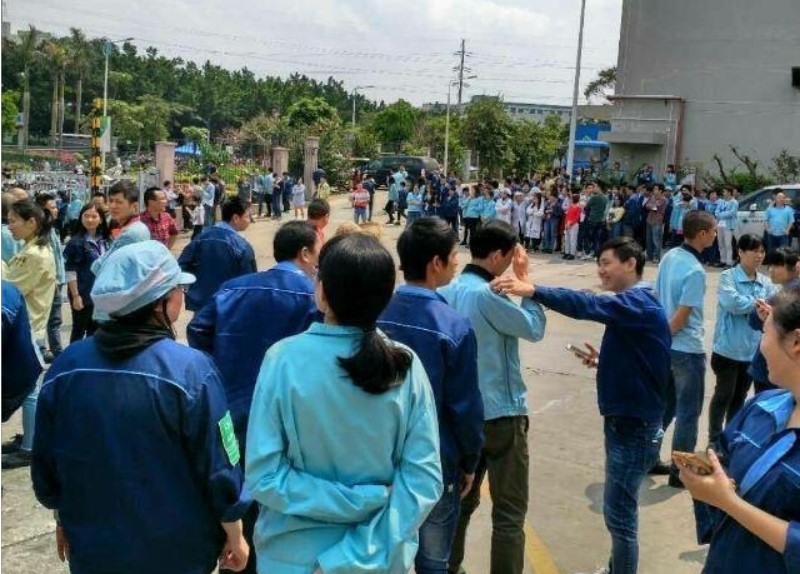Thousands of workers in the southern city of Zhuhai reluctantly returned to their posts this week after their demands were turned down and local trade union officials put social stability above the needs of aggrieved workers.
Around 6,000 workers at Flex electronics, a NASDAQ-listed multinational company, had been on strike since late March over job security concerns after they learnt of an ownership transfer.

Flex workers on strike in Zhuhai
Flex workers complained that they had been kept in the dark about the divestment plan and sold like “equipment in the factory floor.” They demanded that their employment contracts with Flex be terminated (and that Flex pay them long-service compensation) and that they should sign new contracts with the new owners.
Flex turned the workers down arguing that the deal would not alter the terms of their current contracts as they were employed by a subsidiary which would remain intact despite the multinational’s withdrawal from its China operations.
The response did not reassure workers: several cases of ownership transfer in recent years have taught workers that they could still be left without a job after the deal goes through and lose a considerable sum in severance compensation and social insurance contributions as a result.
During the three weeks of one of the biggest strikes in recent years, Zhuhai trade union officials not only failed to properly represent workers and bring management to the bargaining table, significantly, they failed to implement the trade union reform agenda initiated by General Secretary Xi Jinping back in November 2015 and instead clung to the old ideas of stability maintenance left over from the era of Zhou Yongkang.
“The local Party Committee instructed us to maintain social stability,” a Zhuhai union official said in a phone conversation with Han Dongfang, Executive Director of China Labour Bulletin, adding that “it is our administrative responsibility to take part in the stability task force”.
This misunderstanding of the union’s actual responsibilities further alienated workers, already disenchanted with the official trade union, and failed to de-escalate a labour dispute that could have been defused before it turned into an, at times, violent strike.
The Zhuhai official believed that their work at Flex factories was accomplished satisfactorily because “the company had established a well-structured enterprise union with regular elections, organised several activities and paid membership dues.” Moreover, “Flex had, spent 20 million yuan on a dedicated enterprise union building with good facilities.”
However, the official could not explain why a massive strike had erupted if the enterprise union had indeed been such a success. “Maybe there were agitators behind it,” he suggested. And as to why the union did not detect worker concerns earlier, the official dismissed the legitimacy of Flex workers’ demands by emphasising that “the company did not violate any laws” in the ownership transfer.
Attributing labour unrest to behind-the-scene agitators is a blatant underestimation of the Flex workers’ collective consciousness and their ability to stand up for themselves. Moreover, the legality of the workers’ demands in this case was secondary to the fact that there was a lack of trust between workers and management and no effective channels for dialogue. This was precisely the issue the union should have been addressing.
By positioning itself instead as part of a social stability task force, the local union further aggravated workers’ distrust of the very organisation that was supposed to represent them and may have pushed already disgruntled workers to intensify their protest.
If China’s trade union officials are to regain some legitimacy in the eyes of workers, they cannot afford to continue missing the kind of opportunity presented by the Flex strike.
